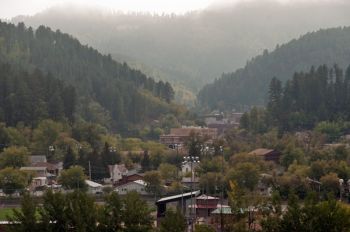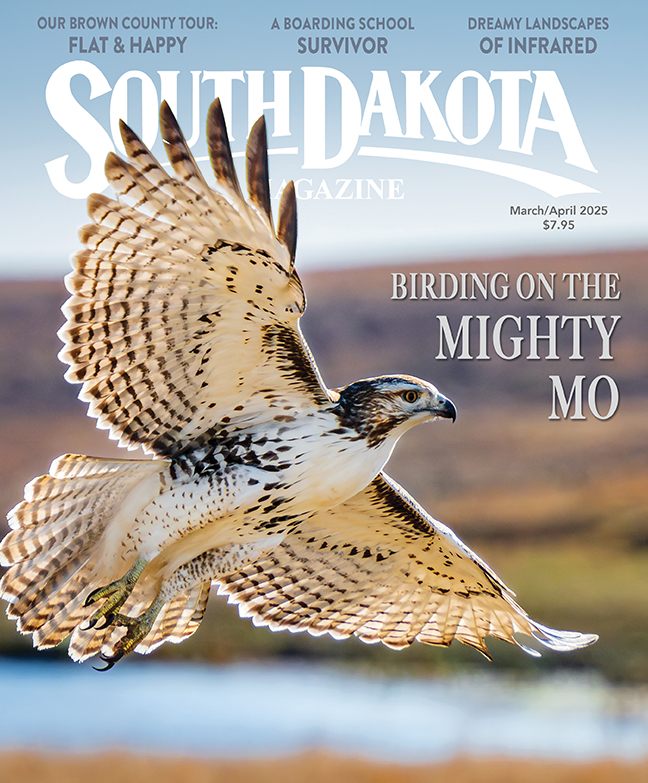The Gift of South Dakota
Subscriptions to South Dakota Magazine make great gifts!
Subscribe today — 1 year (6 issues) is just $29!
Say What?
Nov 6, 2014
“Big one! Mean one!” shrieked the four young Rapid City kids. They were scampering away from a snarling dog headed their direction. Actually, the kids were laughing as much as shrieking, because the dog was a good distance off and tethered by a chain. It wasn’t the barking and laughter that caught my attention, but the words: “Big one! Mean one!”
The phrase is an example of Black Hills lingo. All regions have pet phrases that identify the speakers as in-the-know insiders, although we’ve lost a good deal of local lingo everywhere in this age of homogenized mass communications. Still, lots of my fellow Black Hills residents know that in our region “Big one! Mean one!” is a homegrown expression used to describe everything from strict teachers to stiff alcoholic drinks. It stems from an experience many of us have had at Reptile Gardens, where a young man who can’t be paid nearly enough pulls a gator tail first from the water during the alligator show. Before doing so, however, he asks us whether we’d like to see a little gator or a big one, a nice one or a mean one. You know the answer. It’s a summer ritual and for the rest of the year Black Hills people, especially kids, invent new and creative applications for “Big one! Mean one!”
Last summer, forced into a cozy cafe by a thunderstorm that was a big and mean one, I discussed Black Hills lingo with a couple pals over coffee. Right away we thought of a couple seasonal phrases: “It’s getting noisy,” and “We’ll pay for it.”
“It’s getting noisy” means the dog days of summer are upon us, that back-to-school sales are underway, and that it’s time for that last trip to the lake before fall hits. In other words, it’s August — Sturgis motorcycle rally season. Of course the roar of bikes cues this popular phrase.
“We’ll pay for it” is a March expression uttered only on sunny days when the temperature hits 60 or better. Translation: “It feels like spring, but it’s too early, so certainly some watchful weather god will even the score by making us shovel wet, March snow before real spring arrives.” Things usually play out exactly that way in the Black Hills.
References to the Black Hills in national pop culture are always twisted into local usage. You don’t hear this one much anymore, but there was a time when if someone asked, “How are things in Rapid City?” in a clipped and British manner, what the speaker actually meant was: “Don’t bother telling me about the fun you had shopping or dining in the Hills’ biggest city.” Cary Grant inspired the phrase in Alfred Hitchcock’s 1959 thriller North by Northwest. In the film thugs intent on killing him pursue Grant’s character to the Black Hills. When a conversation turns to Rapid City and Grant asks how things are there, his tone says — given his current dilemma — that he doesn’t really care. Same with his local imitators.
This one’s also fallen from common use, but 40 years ago “Somewhere in the Black Mountain Hills of Dakota” meant “Don’t expect me at the office tomorrow and don’t bother looking for me if a problem arises.” The phrase is the opening lyric of a 1968 Beatles ballad set in the Black Hills (Rocky Raccoon). Back then the line was adopted locally to convey that the speaker wasn’t traveling far, would be nearby in the Hills, yet unavailable. The intentionally vague “Somewhere in the Black Mountain Hills of Dakota” could be Deadwood, Custer, Hot Springs or the top of Harney Peak — and that’s all that you, the listener, needed to know.
Are there phrases known and used in the Black Hills and absolutely nowhere else? My friends and I pondered that question as the big, mean thunderstorm continued to rage. We decided there are a few, including my favorite, “despicable fickleness.” We recalled when a certain Black Hills man professed great loyalty to a local organization a few years ago, and then made a sizeable monetary donation to a rival, out-of-state organization.
“Pretty fickle,” someone in Spearfish said at the time.
“In fact, despicable fickleness!” added another Spearfish citizen, drawing smiles and knowing nods.
“Despicable fickleness” is a line from the Black Hills Passion Play, the outdoor religious drama that drew millions to Spearfish from 1938 to 2008. Pontius Pilate spoke the line as he described the mob that greeted Christ on Palm Sunday and later called for his crucifixion. The Passion Play relied on community volunteers to fill the stage as non-speaking extras, and thousands of Black Hills people answered the call over the decades. Big portions of the script ended up permanently lodged in their brains, and certain lines will pop up in their conversations for the rest of their lives. It won’t happen often, but the next time you hear a South Dakotan bemoan someone’s “despicable fickleness” — during a heated legislative exchange or in an argument about Super Bowl team loyalties, perhaps — ask the speaker about his or her Spearfish connection. There is one, guaranteed.
Editor’s Note: This story is revised from the November/December 2009 issue of South Dakota Magazine. To order a copy or to subscribe, call (800) 456-5117.











Comments